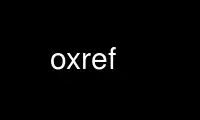
This is the command oxref that can be run in the OnWorks free hosting provider using one of our multiple free online workstations such as Ubuntu Online, Fedora Online, Windows online emulator or MAC OS online emulator
PROGRAM:
NAME
oxref - cross reference utility for multiple languages
SYNOPSIS
oxref [OPTIONS] arguments
[OPTIONS] - see the OPTIONS section below
arguments - object files and/or libraries to process
The cross reference listing is written to the standard output stram.
DESCRIPTION
The program oxref generates a cross reference listing of symbols defined in non-stripped
object files and/or libraries.
A cross reference listing shows the functions using certain symbols (functions, data).
This is useful information during program development and debugging phases. E.g., assuming
that the signature; the pre-conditions or the post-conditions of a function must be
changed it is important to know from what function(s) the function-to-modify is called to
verify that the changes to the modified function do not break its calling functions.
The generated cross reference listing starts with a header showing information about the
program, a time stamp and the arguments passed to oxref. E.g.,
oxref by Frank B. Brokken ([email protected])
oxref V0.90.00 2011
CREATED Wed, 16 Feb 2011 15:21:03 +0000
CROSS REFERENCE FOR: --select define liboxref.a
----------------------------------------------------------------------
RETURN VALUE
Oxref returns 0 to the operating system unless an error occurs or oxref’s version or usage
info is shown or requested. In those cases 1 is returned
OPTIONS
If available, single letter options are listed between parentheses following their
associated long-option variants. Single letter options require arguments if their
associated long options require arguments as well.
o --arg=mode (-a)
Mode specifies the way the output is abbreviated:
count - function parameters are suppressed; instead the number of arguments
required by a function is shown in its parameter list. Example:
usage(1)
instead of
usage(std::string const&)
first - only show the first word of parameters. Example:
insertDefined(unsigned, std::ostream&, std::vector&)
instead of
insertDefined(unsigned int, std::ostream&, std::vector<XrefData,
std::allocator<XrefData> > const&)
<len> - where <len> is a positive integral number (5 is used if <len> is less than
5). <len> specifies the maximum length of parameter names. If parameter names need
to be truncated, an ellipsis replaces the truncated characters. Example using -a
12:
insertDefined(unsigned int, std::ostream&, std::vect...&)
instead of
insertDefined(unsigned int, std::ostream&, std::vector<XrefData,
std::allocator<XrefData> > const&)
o --full-symbol -f
The full names of the symbols are shown, in addition to the plain symbol names.
Full names include class names and/or namespace identifiers. Example:
insertDefined(unsigned int, std::ostream&, std::vector<XrefData,
std::allocator<XrefData> > const&)
Full name: Store::insertDefined(unsigned int, std::ostream&,
std::vector<XrefData, std::allocator<XrefData> > const&)
o --help (-h)
Basic usage information is written to the standard error stream.
o --object-files (-o)
Include the name of object files containing the symbols in the cross reference
listing
o --select=name
Only display the cross-reference of name, where name is the (case sensitive)
initial substring of a symbol
o --select-pattern=regex
Only display the cross-reference of symbols matching the regular expression regex,
where regex is a regular expression matching the regex(7) specification, including
the extensions offered by the pattern(3bobcat) Pattern class. Case sensitive
matching is used here, too.
o --source-files (-s)
Include the name of source files containing the symbols in the cross reference
listing
o --xref-source-files (-x)
Include the name of source files containing the used symbols in the cross reference
listing
o --version (-v)
Oxref’s version number is written to the standard error stream.
EXAMPLES
The examples show how oxref was called, followed by a representative example of a
cross-reference listing for a symbol. Oxref’s own cross reference listing was used:
called as: oxref liboxref
define(std::string const&, bool)
Used By:
Store::setFunction(std::string const&)
Store::setObject(std::string const&)
Store::setSource(std::string const&)
--------------------
called as: oxref -foxs liboxref
define(std::string const&, bool)
Full name: Store::define(std::string const&, bool)
Source: define.cc (1define.o)
Used By:
setfunction.cc: Store::setFunction(std::string const&)
setobject.cc: Store::setObject(std::string const&)
setsource.cc: Store::setSource(std::string const&)
Use oxref online using onworks.net services
